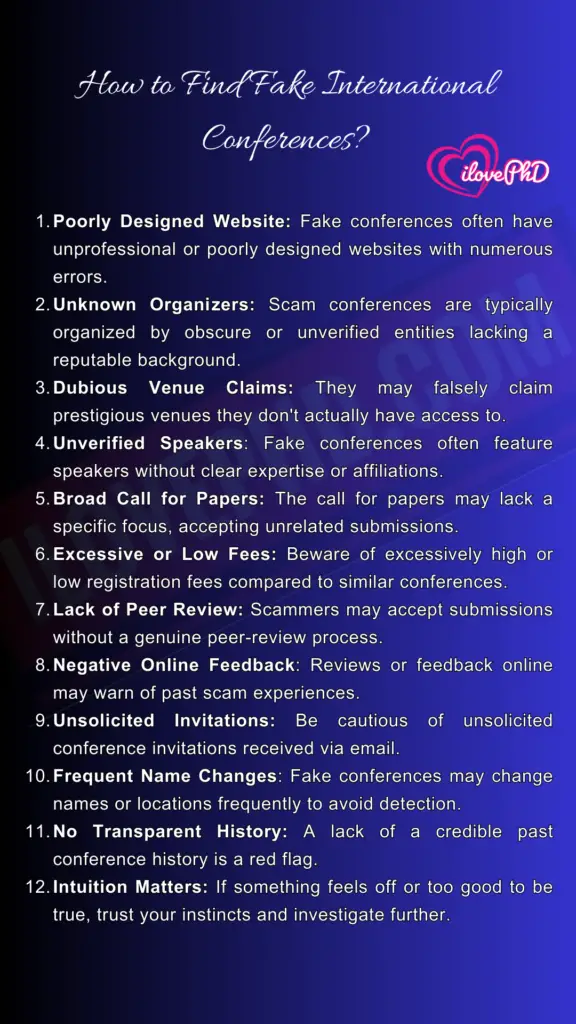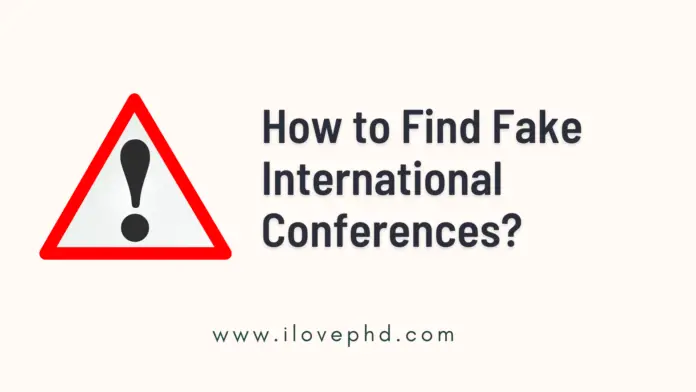Academic and scientific researchers, beware! There’s a growing menace in the world of conferences – fake and scammed international events. These sneaky gatherings can waste your time, and money, and tarnish your reputation. But don’t worry; we’ve got your back! In this article, ilovephd breaks down how to Find Fake International Conferences and ensure you only attend the real deal.
12 Tips to Find Fake International Conferences
Here are some tips to help you find and avoid such fake international conferences:
1. Check the Conference Website
Start by visiting the conference website. Look for a professional design, clear information about the conference, and contact details. Be wary of websites with poor design, spelling errors, or missing contact information.
2. Review The Organizers
Research the organizers and their reputation. Legitimate conferences are often organized by well-known universities, research institutions, or reputable conference organizers. If the organizers are obscure or unverifiable, it’s a red flag.
3. Verify the Venue
Check the conference venue. Scam conferences may list prestigious venues that they don’t actually have access to. You can verify the venue’s availability through official channels or by contacting the venue directly.
4. Examine the Speakers and Committees
Legitimate conferences have respected speakers and organizing committees. Search for the credentials and affiliations of these individuals. Fake conferences often list speakers with no clear expertise or affiliation.
5. Review the Call for Papers
Inspect the call for papers or abstract submissions. Legitimate conferences have specific themes and topics. If the call for papers is too broad or unrelated to the conference theme, it may be a scam.
6. Check Registration Fees:
Be cautious of excessively high or low registration fees. Some scam conferences charge exorbitant fees to exploit researchers, while others offer unrealistically low fees to attract a large number of participants. Compare the fees to similar conferences.
7. Look for the Peer Review Process
Reputable conferences have a peer-review process to evaluate submitted papers. If there’s no mention of peer review or if all submissions are accepted without review, it’s a warning sign.
8. Contact Previous Participants
Try to contact researchers who have attended previous editions of the conference. They can provide insights into their experiences and whether the conference is legitimate.
9. Search for Reviews and Feedback
Look for online reviews or feedback from previous attendees. Researchers often share their experiences on academic forums or social media. Scam conferences will likely have negative reviews and warnings.
10. Beware of Unsolicited Invitations
If you receive unsolicited conference invitations via email, be cautious. Legitimate conferences typically don’t spam researchers with invitations.
11. Check the Conference History
Investigate the conference’s history. Legitimate conferences have a track record of successful past events. Scam conferences may change names or locations frequently.
12. Trust Your Instincts
If something feels off or too good to be true, trust your instincts. It’s better to skip a suspicious conference than to waste time and resources on a scam.
By following these tips and conducting thorough research, you can increase your chances of identifying and avoiding fake or scam international conferences.
Fake conferences may have these characteristics

A simple guide to protect yourself from fake academic conferences. Don’t let these tricksters ruin your research journey. Stick to the real conferences, and you’ll keep your time, money, and reputation safe and sound. Share this with your fellow researchers to keep them in the know!


